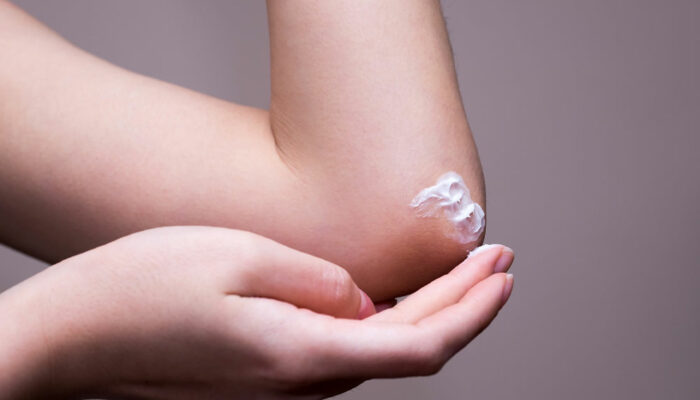Atopic dermatitis – Causes, symptoms, and more

Atopic dermatitis (eczema) is a disorder that results in dry, irritable, and inflammatory skin. Though it can affect anyone, young children are more vulnerable to this disorder. The symptoms include recurring (chronic) and sporadic flare-ups, though it is not contagious. Atopic dermatitis patients risk contracting asthma and seasonal and food allergies. Regular moisturizing and skin disease condition-related treatments help alleviate itching and prevent further outbreaks. Using medicated lotions or ointments during treatment is also helpful.
Symptoms
Depending on an individual’s age, the severity of the condition, and other circumstances, symptoms of atopic dermatitis may vary. Those who have the condition typically experience phases of worsening symptoms, followed by times of improvement or even complete disappearance. The following sections will cover some likely variances in symptoms in more detail.
General eczema symptoms
Eczema symptoms are usually not severe. The most common signs and symptoms of atopic dermatitis include dry, itchy skin, skin flushing, or weeping sores.
Individuals with severe eczema skin disease may need more intensive care to eliminate their problems. Infections of the skin can also result from persistent touching and scratching.
The appearance of the skin area afflicted by atopic dermatitis will vary depending on the frequency of itching and infection. Itching, redness, and irritation can all worsen by rubbing and scratching the skin.
What causes eczema skin disease?
The underlying etiology of eczema still has to be thoroughly comprehended. The cause, according to scientists, is an overactive immune system. When allergens from the outside come in contact with the skin, the immune system reacts, causing eczema to flare up. A collection of typical flare-up triggers is provided below. Additionally, researchers have shown that the bodies of some people with eczema do not produce enough of the protein filaggrin. This protein is essential for keeping skin healthy and nourished.
Certain environmental variables may also aggravate the signs of eczema. These are:
Irritants : These comprise fresh fruit juices or meat, soaps, cleansers, conditioners, and disinfectants.
Allergens : Pet dander, pollen, mold, dust mites—all of these can cause eczema. This condition is called allergic eczema.
Virus : Microbes include pathogens, some fungi, and bacteria such as Staphylococcus aureus.
Temperature : Extreme heat, cold, humidity, and sweat from physical activity can aggravate eczema.
Foods : Wheat, soy, almonds, seeds, milk products, and eggs can aggravate eczema.
Stress : Although stress is not the leading cause of eczema, it can exacerbate the symptoms.
Hormones : A woman may experience worsening eczema symptoms when her hormonal changes fluctuate, such as during pregnancy or at particular points throughout her menstrual cycle.
How can one avoid getting eczema?
Keep the skin hydrated
To prevent eczema, the skin has to be hydrated even if a person is not experiencing irritation. But first, let’s look at the distinction between dryness and skin that is dehydrated (lacking in water). The substances we use to tackle dry skin issues differ from those we use to address dehydrated skin.
Remember that to distinguish between the two situations, dry skin lacks facial oil, whereas dehydrated skin exhibits desquamation or a tight, uncomfortable feeling. Consider adopting the following habits to avoid eczema skin disease and maintain the moisture of the skin:
Drink a lot of water
Apply a gentle cleanser
After a shower or bath, hydrate the skin with a moisturizing product
Determine and prevent potential triggers
Pollen, pet dander, mildew, and poor eating habits can cause or worsen an eczema flare-up. Recognizing the eczema triggers will help a person avoid them as much as possible. The pharmacist can also be of great help.
Take brief, warm showers
Taking a warm bath at the end of a chilly winter day can be incredibly rejuvenating, but it is not a good idea if one is making efforts to avoid or treat eczema. It is clear why this is the case. The lipid layer, or the upper surface of the epidermis that keeps the skin moisturized, can get destroyed by bathing in too-warm water. Experts advise using the following procedures in addition to lowering water temperature:
Restrict baths to 10 minutes each
Remove any irritants, sediments, or allergens from the skin
Choose hypoallergenic, odorless soap
Use a humidifier
Winter brings dry weather, and the dry season frequently causes eczema flare-ups. Low humidity dehydrates the skin, which can result in eczema. If the apartment that one lives in is too dry, consider installing a humidifier in the room and any other space where one’s family devotes a lot of time.
Above all, refrain from scratching
We are all aware of this. Eczema or atopic dermatitis builds up a burning desire to scratch. But pay heed—the impulse to itch must be resisted, even if it temporarily improves one’s mood. Scratching is counterproductive and exacerbates any problems one may already have, worsening the situation. In actuality, it will only serve to aggravate the itching. Itching and rashes are all caused by scratching eczema. A person scratches because one is irritated and momentarily feels better, but the rashes worsen. Scratching does the exact opposite of what it is expected to do.
Choose apparel made only of cotton
If a person frequently experiences eczema flare-ups, cotton is a comfortable material that allows the skin to relax and helps prevent itching. In general, and especially when jogging or participating in sports, always select light, flexible materials that do not rub against or scrape the skin.
Remain calm
Excessive heating reduces humidity, dehydrating the epidermis and triggering eczema flare-ups. Sweating from overheating can aggravate skin disease even more. As a result, one should refrain from setting the home’s thermostat too high throughout the winter. Instead, choose light bedding, especially cotton, and keep the bedroom chilly at night.
Conclusion
Atopic dermatitis or eczema is a long lasting condition that can be uncomfortable and range in intensity. Based on a person’s age, it may manifest itself in various ways. The signs could be more challenging for those with darker skin tones. Though there is no cure, eczema flare-ups can be treated and avoided with over-the-counter products, moisturizers, and lifestyle modifications.





